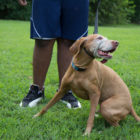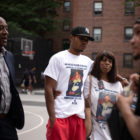
Teens Learn Life Skills Training Therapy Dogs
|
New York City teenagers who have been in trouble with the law are receiving help from some unlikely allies this summer — dogs.
Juvenile Justice Information Exchange (https://jjie.org/page/71/)

In late September, Torri was driving down the highway with her 11-year-old son Junior in the back seat when her phone started ringing.
It was the Hamilton County Sheriff’s deputy who worked at Junior’s middle school in Chattanooga, Tennessee. Deputy Arthur Richardson asked Torri where she was. She told him she was on the way to a family birthday dinner at LongHorn Steakhouse.
“He said, ‘Is Junior with you?’” Torri recalled.
Earlier that day, Junior had been accused by other students of making a threat against the school. When Torri had come to pick him up, she’d spoken with Richardson and with administrators, who’d told her he was allowed to return to class the next day. The principal had said she would carry out an investigation then. ProPublica and WPLN are using a nickname for Junior and not including Torri’s last name at the family’s request, to prevent him from being identifiable.
When Richardson called her in the car, Torri immediately felt uneasy. He didn’t say much before hanging up, and she thought about turning around to go home. But she kept driving. When they walked into the restaurant, Torri watched as Junior happily greeted his family.
Soon her phone rang again. It was the deputy. He said he was outside in the strip mall’s parking lot and needed to talk to Junior. Torri called Junior’s stepdad, Kevin Boyer, for extra support, putting him on speaker as she went outside to talk to Richardson. She left Junior with the family, wanting to protect her son for as long as she could ...

New York City teenagers who have been in trouble with the law are receiving help from some unlikely allies this summer — dogs.

For close to seven years, a Mississippi man bought firearms in and around Natchez before sending them to contacts in Chicago, many of them family members he grew up with.
Once there, the weapons would find their way to the streets of some of the city’s most violence-plagued communities and be used in homicides, shootings and other crimes.

“I don't know how to tell you this, but your brother was shot.”
Michael Taylor’s heartbeat quickened. He was having difficulty breathing. The words...

Do not call Brittany Gray, Kenderick Cox and Marcellus Gray activists. The Greenwood natives prefer to be called who they are — members of the community...

Ten years ago, Rosemary McCoy never would have imagined that today she’d be in a Jacksonville library, tears streaming down her face, as she tells a stranger how it feels to...

At first glance, Saturday’s Remembrance Day for Nicholas Heyward Jr. seemed like the kind of late summer party that is so ubiquitous in Brooklyn’s housing projects, one last bash before the kids need supplies and clothes for the beginning of the new school year.

Today, Judge Candice Bates-Anderson will likely take the bench in Orleans Parish Juvenile Court and sentence a chubby-cheeked 13-year-old boy to a term called “juvenile life,” which means he would remain in juvenile prison until he’s 21.

Youth homelessness is a tragedy, not a crime. But in cities across the country, homeless youth face civil and even criminal penalties for unavoidable human activities like standing, sitting and sleeping in the very streets where they’re trying to survive.